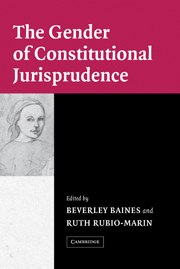Book contents
- Frontmatter
- Contents
- List of Contributors
- Acknowledgments
- The Gender of Constitutional Jurisprudence
- Introduction: Toward a Feminist Constitutional Agenda
- 1 Speaking into a Silence: Embedded Constitutionalism, the Australian Constitution, and the Rights of Women
- 2 Using the Canadian Charter of Rights and Freedoms to Constitute Women
- 3 Emancipatory Equality: Gender Jurisprudence under the Colombian Constitution
- 4 Gender Equality and International Human Rights in Costa Rican Constitutional Jurisprudence
- 5 Constituting Women: The French Ways
- 6 Gender in the German Constitution
- 7 India, Sex Equality, and Constitutional Law
- 8 Constitutional Transformation, Gender Equality, and Religious/National Conflict in Israel: Tentative Progress through the Obstacle Course
- 9 “No Nation Can Be Free When One Half of It Is Enslaved”: Constitutional Equality for Women in South Africa
- 10 Engendering the Constitution: The Spanish Experience
- 11 Gender Equality from a Constitutional Perspective: The Case of Turkey
- 12 Gender and the United States Constitution: Equal Protection, Privacy, and Federalism
- Index
- References
1 - Speaking into a Silence: Embedded Constitutionalism, the Australian Constitution, and the Rights of Women
Published online by Cambridge University Press: 14 January 2010
- Frontmatter
- Contents
- List of Contributors
- Acknowledgments
- The Gender of Constitutional Jurisprudence
- Introduction: Toward a Feminist Constitutional Agenda
- 1 Speaking into a Silence: Embedded Constitutionalism, the Australian Constitution, and the Rights of Women
- 2 Using the Canadian Charter of Rights and Freedoms to Constitute Women
- 3 Emancipatory Equality: Gender Jurisprudence under the Colombian Constitution
- 4 Gender Equality and International Human Rights in Costa Rican Constitutional Jurisprudence
- 5 Constituting Women: The French Ways
- 6 Gender in the German Constitution
- 7 India, Sex Equality, and Constitutional Law
- 8 Constitutional Transformation, Gender Equality, and Religious/National Conflict in Israel: Tentative Progress through the Obstacle Course
- 9 “No Nation Can Be Free When One Half of It Is Enslaved”: Constitutional Equality for Women in South Africa
- 10 Engendering the Constitution: The Spanish Experience
- 11 Gender Equality from a Constitutional Perspective: The Case of Turkey
- 12 Gender and the United States Constitution: Equal Protection, Privacy, and Federalism
- Index
- References
Summary
The Australian Constitution is a document that is mostly silent about rights. It has no comprehensive set of enumerated rights in the form of a bill of rights. Instead, it sets up a federal system and the basic framework of a representative democracy, with a few specific rights scattered throughout. Federal and state legislation provide the express means of protection of equality. Yet, the Constitution is a crucial part of the framework for understanding women's rights in Australia. Not only does it provide the source of federal legislative power with respect to equality but also, in recent years, a minority view on the High Court has asserted that equality is the underlying principle upon which the Constitution is founded.
In this chapter, we explore the way that the Australian Constitution, without an explicit set of enumerated rights, can and should be used to establish and protect women's rights in practice. We consider how women have shaped the Australian Constitution both in its creation and throughout its development to the present day and argue that the federal system reinforces the traditional division of public and private life to the detriment of women. Looking at the formal mechanisms that exist for pursuing equality and antidiscrimination claims in Australia with reference to international covenants, domestic, federal, and state legislation, we show that Australian constitutional rights are embedded into a larger institutional, bureaucratic, and cultural framework.
- Type
- Chapter
- Information
- The Gender of Constitutional Jurisprudence , pp. 22 - 47Publisher: Cambridge University PressPrint publication year: 2004
References
- 1
- Cited by



